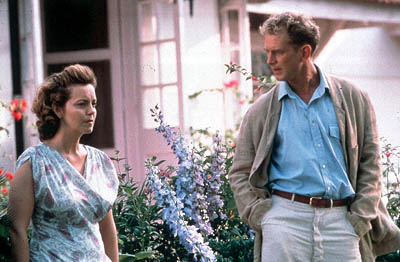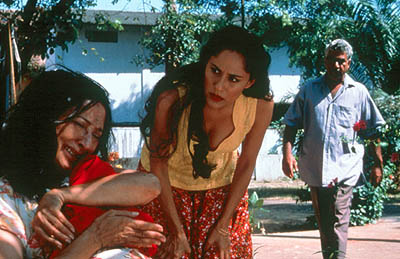

Cotton Mary is an Anglo-Indian. That is, she is half-British and half-Indian. In the past, children of mixed-races had a hard enough time growing up in America, so it is easy to imagine life as an Anglo-Indian in 1950s India. Mary (Madhur Jaffrey, Flawless) is trapped between two worlds, one of desperate Indian poverty and the other of Imperial British wealth. She views herself as English, much to the amusement of other English women in India, who ignore her completely. To them, she is a lowly Indian. She calls herself "Cotton" because she will only wear English cotton. Cotton Mary is about Mary and Lily Macintosh (Greta Scacchi, The Red Violin, Emma), and is the latest film from period piece masters Merchant Ivory. That alone means that visually, Cotton Mary soars above other films. Every detail seems perfect both in the Macintosh household and other surrounding areas within the movie.
Mary and Lily meet at a hospital, where Mary is a nurse. Lily just gave birth, and is not producing milk for her newborn. Mary promises to help and secretly takes the child to her sister for nursing. Mary is probably one of the vilest characters in recent films, and Jaffrey plays her to a tee. Lily asks Mary to come back to the house as a nurse, since she seems to be the only one who can feed the baby, and so begins Mary's attempts to insinuate herself completely into the Macintosh household. Mary talks down to the other servants in the household, and refers to herself as English whenever she can. She begins to tell lies to try to dismiss the other servants, leaving only her. Mary also lies to her relatives about her position in the Macintosh household. Lily is oblivious to all this, mainly because her mind is on the baby. Her husband John (James Wilby, An Ideal Husband) is a reporter who also enjoys the company of other women. She falls so easily to Mary's deceptions because her mind is elsewhere. Lily is the only character the audience can empathize with, but she is so distant and emotionally detached that any interest in her character is soon lost.
There is little else to Alexandra Viets' story. After a while, Mary is so seemingly psychotic that audience reaction to her lies is palpable. The only people who actually notice are Lily's daughter and servant, but no one will listen to them. Mary's desires are understandable, although her methods are despicable. She wants something better than what is out there for her. There are many examples of people reacting negatively to Mary's attempts to present herself as English, but little is shown in terms of the Indian reaction to people like Mary. Director Ismail Merchant (The Remains of the Day, A Soldier's Daughter Never Cries) easily shows the dichotomy between the Macintosh's large estate and Mary's family's lowly house. The story moves slowly, which only extends the hatred towards Mary. Of course, since this is a Merchant Ivory film, there is the obligatory scene of a woman (this time, a girl) running through fields. There is little else to remember this film by.